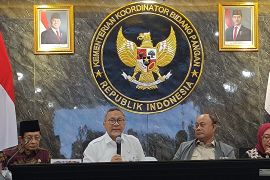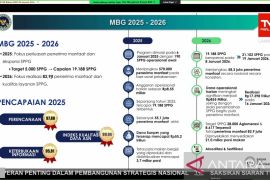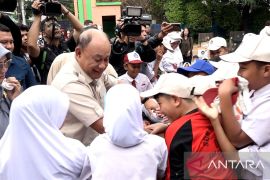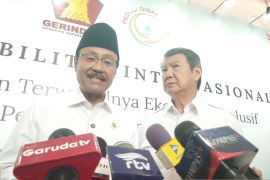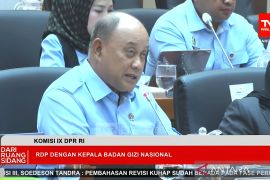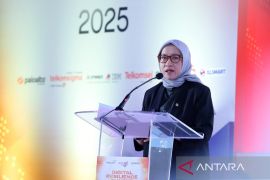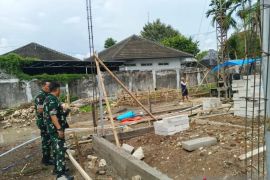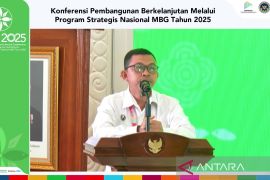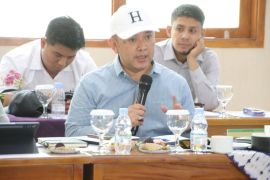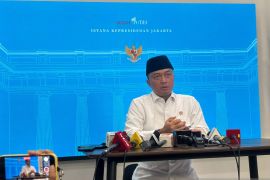This program was chosen to handle stunting in the country and improve the quality of Indonesian human resources by disbursing free nutritious meals to students from pre-school to high school and vocational school, Islamic boarding school students, and pregnant women.
Based on the 2023 Indonesian Health Survey (SKI), stunting prevalence in Indonesia was recorded at 21.5 percent, down 0.1 percent from the previous year.
In 2024, the government is targeting stunting prevalence to reach 14 percent.
The free nutritious meals program is expected to boost the economy in addition to helping to reduce stunting prevalence and improve the quality of human resources.
Head of the National Food Agency (Bapanas), Arief Prasetyo Adi is optimistic that the program would serve as one of the economic driving forces.
According to Adi, the integration between the upstream and downstream of food sectors is important to maintain economic stability. With the free meals program, local farmers will benefit from the absorption of food used to fulfill the program.
Related news: Ministry to guarantee local foods in Free Meals Program
Implementation
On August 15, 2024, President Joko Widodo officiated Dadan Hindayana as head of the National Nutrition Agency.
This agency is tasked with fulfilling national nutrition needs based on Presidential Decree Number 83 of 2024.
Hindayana remarked that the program would start gradually on January 2, 2025.
The program would target 82.9 million beneficiaries, with a budget of Rp800 billion per day (US$49 million).
“Once it fully runs, we will spend Rp1.2 trillion every day as our investment in the future of our human resources with this free meal program,” he remarked.
Hindayana said his side would cover 75 percent of the daily budget, or around Rp800 billion.
The budget will be channeled to purchase raw materials for food menus from agricultural products, thereby boosting the circulation of large amounts of money in society.
A trial involving three thousand children indicated the requirement of around 200 kilograms of rice, 350 kilograms of chicken or three thousand eggs, 350 kilograms of vegetables, and 600 liters of milk per day for this free nutritious meal program.
"This only comes from one service unit. If this program runs fully, there will be about 30 thousand service units throughout Indonesia that serve pregnant women, breastfeeding mothers, toddlers, and students from preschool to high school, including Islamic boarding schools and other religious schools. This is a very large scale," Hindayana revealed.
In November 2024, his side would run another trial targeting schools while collecting data on the total number of pregnant women, breastfeeding mothers, toddlers, and students across Indonesia.
Vice President-elect Gibran also revealed that his side would provide a special menu for students with allergies to certain food ingredients.
His side is still calculating and formulating the best scheme to implement this program.
For instance, the trial menu distributed to Jakarta 70 State High School consisted of white rice, teriyaki chicken, vegetable salad, tofu, potato fritters, eggs, and bananas, with a total of 781.58 kilocalories (Kcal) per box, has a budget of Rp25 thousand per portion.
Related news: Agency head confirms Rp800 B daily spending for free meals program
Economic advantage
As aforementioned, this free nutritious meal program is also expected to improve Indonesia's economy.
According to Hindayana, this program can absorb 1.5 million workers in service units.
"If traditional cooking utensils are used, it requires around 45-46 people. Therefore, there will be new job opportunities for 1.5 million people (for 30 thousand service units)," he noted.
The service unit is different from a public kitchen, where it handles the cooking of food and also manages local agricultural products.
Each service unit will also have a manager who regulates the purchase and processing of food.
Employees involved in the service unit are prioritized from the local community. The service unit would also involve local farmers in supplying food ingredients for the program.
Furthermore, Presidential Regulation Number 81 of 2024 concerning the Acceleration of Food Diversification Based on Local Resource Potential supported the mainstreaming of local food production and consumption.
Hence, each region will utilize its own local food for this free meal program, thereby resulting in the certainty of products being absorbed, which also leads to improvement in farmers' welfare, Bapanas head, Arief Prasetyo Adi, stated.
According to Bank Mandiri Chief Economist Andry Asmoro, the free meals program can potentially increase Indonesia's gross domestic product (GDP) by 1.94 percent and improve growth in various derivative sectors.
The growth is projected to occur in the food and beverage provision sector by 54.6 percent, followed by the food and beverage industry sector, at 16.9 percent; wholesale and retail trade, excluding cars and motorbikes, 5.2 percent; and the fisheries sector, 3.3 percent.
The food crop agriculture sector, the annual plantation sector, and the livestock sector will also experience growth of 3.1 percent, 2.6 percent, and 2.5 percent respectively.
All the points above show promising attempts to improve the country's future generation.
The implementation of the first batch of this program followed by proper monitoring and evaluation are crucial to determine the sustainability of this program.
Responsible parties in this program should ensure that the large amounts of money spent are felt directly by the targeted audience and benefit local farmers and MSMEs and do not only satisfy the needs of certain groups of people looking to take advantage of this program.
Related news: Free meal program may create 1.5 mln jobs: nutrition agency
Editor: Yuni Arisandy Sinaga
Copyright © ANTARA 2024

